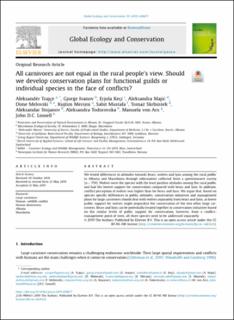Please use this identifier to cite or link to this item:
https://doi.org/10.21256/zhaw-26192Full metadata record
| DC Field | Value | Language |
|---|---|---|
| dc.contributor.author | Trajçe, Aleksandër | - |
| dc.contributor.author | Ivanov, Gjorge | - |
| dc.contributor.author | Keçi, Erjola | - |
| dc.contributor.author | Majić, Aleksandra | - |
| dc.contributor.author | Melovski, Dime | - |
| dc.contributor.author | Mersini, Kujtim | - |
| dc.contributor.author | Mustafa, Sabit | - |
| dc.contributor.author | Skrbinšek, Tomaž | - |
| dc.contributor.author | Stojanov, Aleksandar | - |
| dc.contributor.author | Todorovska, Aleksandra | - |
| dc.contributor.author | von Arx, Manuela | - |
| dc.contributor.author | Linnell, John D.C. | - |
| dc.date.accessioned | 2022-11-25T10:47:11Z | - |
| dc.date.available | 2022-11-25T10:47:11Z | - |
| dc.date.issued | 2019 | - |
| dc.identifier.issn | 2351-9894 | de_CH |
| dc.identifier.uri | https://digitalcollection.zhaw.ch/handle/11475/26192 | - |
| dc.description.abstract | We tested differences in attitudes towards bears, wolves and lynx among the rural public in Albania and Macedonia through information collected from a questionnaire survey (n = 759). Wolves were the species with the least positive attitudes among the rural public and had the lowest support for conservation compared with bears and lynx. In addition, conflict perception of wolves was higher than for bears and lynx. We argue that, based on species specific differences in public attitudes, conservation initiatives and management plans for large carnivores should deal with wolves separately from bears and lynx, as lower public support for wolves might jeopardise the conservation of the two other large carnivores. Bears and lynx can be potentially treated together in conservation initiatives based on the similar levels of public support for conservation, however, from a conflict-management point of view, all three species need to be addressed separately. | de_CH |
| dc.language.iso | en | de_CH |
| dc.publisher | Elsevier | de_CH |
| dc.relation.ispartof | Global Ecology and Conservation | de_CH |
| dc.rights | http://creativecommons.org/licenses/by-nc-nd/4.0/ | de_CH |
| dc.subject | Large carnivore | de_CH |
| dc.subject | Human–wildlife conflict | de_CH |
| dc.subject | Human dimension | de_CH |
| dc.subject | Albania | de_CH |
| dc.subject | Macedonia | de_CH |
| dc.subject | Bear | de_CH |
| dc.subject | Wolf | de_CH |
| dc.subject | Lynx | de_CH |
| dc.subject.ddc | 333: Bodenwirtschaft und Ressourcen | de_CH |
| dc.subject.ddc | 590: Tiere (Zoologie) | de_CH |
| dc.title | All carnivores are not equal in the rural people's view : should we develop conservation plans for functional guilds or individual species in the face of conflicts? | de_CH |
| dc.type | Beitrag in wissenschaftlicher Zeitschrift | de_CH |
| dcterms.type | Text | de_CH |
| zhaw.departement | Life Sciences und Facility Management | de_CH |
| zhaw.organisationalunit | Institut für Umwelt und Natürliche Ressourcen (IUNR) | de_CH |
| dc.identifier.doi | 10.1016/j.gecco.2019.e00677 | de_CH |
| dc.identifier.doi | 10.21256/zhaw-26192 | - |
| zhaw.funding.eu | No | de_CH |
| zhaw.issue | e00677 | de_CH |
| zhaw.originated.zhaw | Yes | de_CH |
| zhaw.publication.status | publishedVersion | de_CH |
| zhaw.volume | 19 | de_CH |
| zhaw.publication.review | Peer review (Publikation) | de_CH |
| zhaw.author.additional | No | de_CH |
| zhaw.display.portrait | Yes | de_CH |
| Appears in collections: | Publikationen Life Sciences und Facility Management | |
Files in This Item:
| File | Description | Size | Format | |
|---|---|---|---|---|
| 2019_Trajce-etal_All-carnivores-are-not-equal-rural-peoples-view_gecco.pdf | 1.81 MB | Adobe PDF |  View/Open |
Show simple item record
Trajçe, A., Ivanov, G., Keçi, E., Majić, A., Melovski, D., Mersini, K., Mustafa, S., Skrbinšek, T., Stojanov, A., Todorovska, A., von Arx, M., & Linnell, J. D. C. (2019). All carnivores are not equal in the rural people’s view : should we develop conservation plans for functional guilds or individual species in the face of conflicts? Global Ecology and Conservation, 19(e00677). https://doi.org/10.1016/j.gecco.2019.e00677
Trajçe, A. et al. (2019) ‘All carnivores are not equal in the rural people’s view : should we develop conservation plans for functional guilds or individual species in the face of conflicts?’, Global Ecology and Conservation, 19(e00677). Available at: https://doi.org/10.1016/j.gecco.2019.e00677.
A. Trajçe et al., “All carnivores are not equal in the rural people’s view : should we develop conservation plans for functional guilds or individual species in the face of conflicts?,” Global Ecology and Conservation, vol. 19, no. e00677, 2019, doi: 10.1016/j.gecco.2019.e00677.
TRAJÇE, Aleksandër, Gjorge IVANOV, Erjola KEÇI, Aleksandra MAJIĆ, Dime MELOVSKI, Kujtim MERSINI, Sabit MUSTAFA, Tomaž SKRBINŠEK, Aleksandar STOJANOV, Aleksandra TODOROVSKA, Manuela VON ARX und John D.C. LINNELL, 2019. All carnivores are not equal in the rural people’s view : should we develop conservation plans for functional guilds or individual species in the face of conflicts? Global Ecology and Conservation. 2019. Bd. 19, Nr. e00677. DOI 10.1016/j.gecco.2019.e00677
Trajçe, Aleksandër, Gjorge Ivanov, Erjola Keçi, Aleksandra Majić, Dime Melovski, Kujtim Mersini, Sabit Mustafa, et al. 2019. “All Carnivores Are Not Equal in the Rural People’s View : Should We Develop Conservation Plans for Functional Guilds or Individual Species in the Face of Conflicts?” Global Ecology and Conservation 19 (e00677). https://doi.org/10.1016/j.gecco.2019.e00677.
Trajçe, Aleksandër, et al. “All Carnivores Are Not Equal in the Rural People’s View : Should We Develop Conservation Plans for Functional Guilds or Individual Species in the Face of Conflicts?” Global Ecology and Conservation, vol. 19, no. e00677, 2019, https://doi.org/10.1016/j.gecco.2019.e00677.
Items in DSpace are protected by copyright, with all rights reserved, unless otherwise indicated.